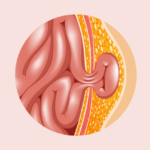Chronic constipation is infrequent or difficult bowel movements that lasts for a long time (usually 3 months or longer). It affects people of all ages and can have a significant impact on quality of life. Chronic constipation is a common problem affecting an estimated 14% of the world’s population. In the United States, it is one of the most common gastrointestinal upsets and sees more than 2.5 million people each year. Understanding the causes, symptoms, and treatment options for chronic constipation is critical to effectively treating and treating the condition. This blog post delves into this topic and provides valuable information for those who suffer from chronic constipation, a common digestive problem that greatly impacts quality of life. Seeking professional medical assistance from a qualified general surgeon in Pune like Dr. Sandhya Bade is essential for effective diagnosis and constipation treatment.
Causes of Chronic Constipation
- Diet and Lifestyle Factors: A diet low in fiber and water can lead to chronic constipation. In addition, lack of physical activity, neglecting the urge to have a bowel movement, and changes in daily life can also contribute to chronic constipation.
- Medications and Diseases: Certain drugs, such as opioids, antidepressants, and antacids, can cause constipation as a side effect. Conditions such as irritable bowel syndrome (IBS), hypothyroidism, and diabetes can also cause chronic constipation.
- Hormonal imbalance: Hormonal imbalance during pregnancy and menopause can cause chronic constipation.
- Neurological disorders: Illnesses such as Parkinson’s disease, multiple sclerosis, and spinal cord injuries can damage nerves in the colon and rectum, leading to chronic constipation. It is important to identify the underlying cause of chronic constipation in order to develop an effective treatment plan. A consultation with your doctor can help diagnose the cause of chronic constipation and determine appropriate treatment options.
Symptoms of Chronic Constipation
Chronic constipation is characterized by irregular or difficult bowel movements, which can lead to unpleasant symptoms such as abdominal pain and bloating. Common symptoms of chronic constipation include:
- Difficult bowel movements: People with chronic constipation may have trouble passing stools because of their consistency and size. This can cause pain and discomfort during bowel movements.
- Rare bowel movements: Rare bowel movements are also a common symptom of chronic constipation. Usually a person has one or two bowel movements a day, but a person with chronic constipation has fewer bowel movements, and he may have one or two bowel movements a week.
- Abdominal discomfort and bloating: Chronic constipation causes abdominal discomfort and bloating, and a tight, swollen stomach. This can cause discomfort and pain.
- Compression during defecation: Because the stool is hard, people with chronic constipation have to strain to have a bowel movement, which can lead to discomfort, pain, and even rectal bleeding.
- A feeling that the intestines are not empty: People with chronic constipation may feel that their intestines are not completely empty after a bowel movement, causing discomfort and bloating. It is important to note that some of these symptoms can be due to other digestive conditions. Therefore, it is always best to consult your doctor for proper diagnosis and treatment.
Diagnosis and treatment options
- Physical examination and medical history: A doctor may do a physical examination and review the patient’s medical history to identify underlying causes of chronic constipation, such as: For example, medicine or illness.
- Diagnostic tests: In some cases, your doctor may do diagnostic tests, such as blood tests, imaging tests, and special tests of the digestive tract, to further investigate the cause of chronic constipation.
- Lifestyle changes: Simple lifestyle changes such as increasing your fiber intake, drinking more water, exercising regularly, and establishing regular bowel habits can help relieve chronic constipation.
- Medications for Chronic Constipation: There are several types of drugs that may be prescribed for chronic constipation, including laxatives, stool softeners, and prokinetic agents. These drugs work to soften stools, facilitate bowel movements, and stimulate bowel contractions.
- Surgical Options: Rarely, surgery may be recommended to treat chronic constipation that does not respond to other treatments. Surgical options include removing part of the colon or creating an artificial opening in the abdomen to allow more frequent bowel movements.
It is important to consult your doctor before starting treatment for chronic constipation. Treatment options depend on the underlying cause and the severity of the condition.
Prevention of Chronic Constipation
Chronic constipation can be a frustrating and uncomfortable condition. However, there are some precautions individuals can take to reduce their risk of chronic constipation.
- Diet and exercise: One of the most important preventive measures against chronic constipation is maintaining a healthy diet and regular exercise. A diet high in fiber and low in processed foods can encourage regular bowel movements. Additionally, regular exercise stimulates the digestive system and helps promote healthy bowel function.
- Adequate hydration: Adequate fluid intake is important to prevent chronic constipation. Adequate hydration helps soften stools and make bowel movements easier. Aim for at least eight glasses of water per day, and consider increasing your fluid intake during periods of high activity and hot weather.
- Gut training: Bowel training techniques can also help prevent chronic constipation. This includes setting a time to go to the bathroom regularly even if you don’t feel it. This helps train your body to have regular bowel movements.
- Addressing underlying medical conditions: If chronic constipation is related to an underlying medical condition, it is important to address and treat the condition. For example, if constipation is a side effect of medication, talk to your doctor about possible alternatives. Additionally, if chronic constipation is associated with a neurological or gastrointestinal disorder, proper treatment of this condition can relieve symptoms of constipation.
By implementing these precautions, individuals can reduce their risk of developing chronic constipation and promote overall digestive health. However, if you do experience chronic constipation, it’s important to see your doctor to determine the underlying cause and appropriate treatment options.
Conclusion
Chronic constipation is a common gastrointestinal condition that affects many people around the world. In this blog post, we discussed the causes, symptoms, and various treatment options for chronic constipation. We learned that it is important to understand the symptoms of chronic constipation, such as: B. Infrequent bowel movements, difficult bowel movements, straining during bowel movements. These may indicate a more serious underlying disease.
There are several treatment options for chronic constipation, including lifestyle changes such as increasing fiber intake, drinking more water, and exercising regularly. Over-the-counter laxatives and prescription drugs can also help relieve symptoms of chronic constipation. Underlying conditions such as irritable bowel syndrome, hypothyroidism, and neuropathy can cause chronic constipation, so people with chronic constipation are advised to seek medical attention as needed.
Constipation is a common digestive problem that affects people of all ages. It can be caused by a variety of factors, including a low-fiber diet, dehydration, lack of exercise, certain medications, and underlying medical conditions. Left untreated, chronic constipation can lead to complications such as hemorrhoids, anal fissures, and fecal obstruction. Those suffering from chronic constipation can consult a Dr. Sandhya Bade is a renowned General Surgeon in Pune with extensive experience in treating digestive problems. Dr. Bade specializes in diagnosing and treating constipation and takes a multidisciplinary approach to addressing the underlying causes of the condition. For people with chronic constipation, Dr. Bade recommends medical interventions such as laxatives, suppositories, and enemas to relieve symptoms. In some cases, Dr. Bade recommends surgery to correct anatomic abnormalities that contribute to chronic constipation.




